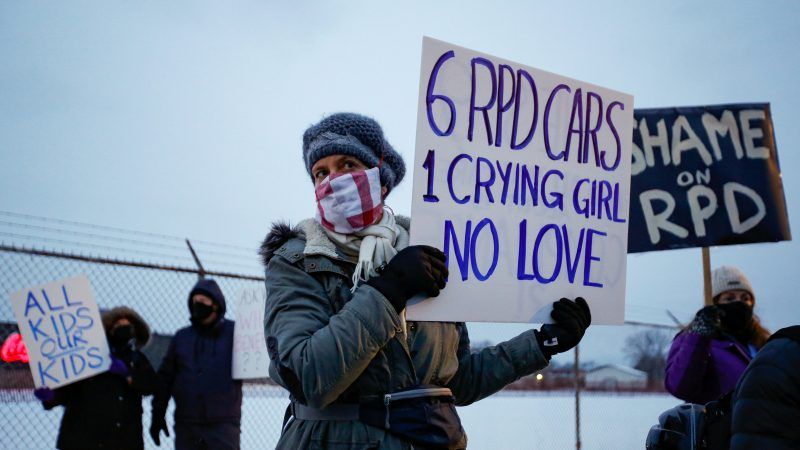Outrage Over Handcuffed Children Leads States To Consider Raising Minimum Age of Arrest
In 28 states, there's no minimum age for arresting kids.

A 6-year-old boy charged with a crime for picking a tulip. An 8-year-old whose wrists were too small for a pair of handcuffs. A 9-year-old girl handcuffed and pepper sprayed in the back of a police cruiser.
News stories and viral videos of small children being arrested and physically restrained have illustrated a disturbing fact about the American criminal justice system: In most states there's no limit on when a small child can be considered a criminal. Now legislators around the country are pushing bills to raise the minimum age at which kids can be arrested.
Lawmakers in Colorado, Florida, Kentucky, Maryland, New York, and North Carolina have all introduced bills to restrict the arrests of small children, ban their handcuffing, and otherwise reduce interactions between kids and the criminal justice system. Mississippi enacted a law earlier this month raising the minimum age for juvenile detention from 10 to 12.
In North Carolina, an investigation by the Raleigh News and Observer revealed this month that children as young as 6—too young to comprehend what was happening in the courtroom—had been charged with crimes. The story's lead anecdote involved a six-year-old boy charged with destruction of property for picking a tulip.
The News and Observer reports:
Other cases have involved young children who have broken windows at a construction site with older friends and stood on a chair and thrown a pencil at a teacher, attorneys said. Another case involved sexual exploration with another child, attorneys said.
One of Mitchell's youngest clients was a 9-year-old with autism whose response to a teacher resulted in him being found guilty of assault on a government official.
A North Carolina mother filed a civil rights lawsuit last October against a policeman who handcuffed and held her autistic 7-year-old son prone on the ground for nearly 40 minutes.
Twenty-eight states have no minimum age for juvenile delinquency, while others set the bar low. North Carolina's, for instance, is at age 6. TechDirt reports that North Carolina's Juvenile Justice Division supports legislation that would raise the minimum age for criminal prosecution to 10.
In New York, where the minimum age of arrest and prosecution of children as juvenile delinquents is 7, public defender groups have sent a letter to Democratic Gov. Andrew Cuomo and party leaders pushing for passage of legislation to hike the age to 12. The push follows the release of body camera footage showing police in Rochester, New York, pepper spraying a handcuffed 9-year-old girl.
A bill introduced in the New York Senate would also prohibit sending kids under 13 to juvenile detention.
In Maryland, state lawmakers are considering legislation that would divert children younger than 13 who commit nonviolent misdemeanors away from the criminal justice system. And legislators in Kentucky have introduced a bill that would ban kids 12 and younger from being tried before a judge.
Meanwhile in Florida, legislators are trying once again to raise the minimum age of arrest, after similar bills failed last year. The Sunshine State has been the site of several viral stories of small children being arrested. Last August, body camera footage emerged showing officers in Key West trying and failing to handcuff an 8-year-old boy, whose wrists were too small for the cuffs. An Orlando school cop made national headlines in 2019 when he arrested a 6-year-old girl.
A bill introduced by Democratic state Sen. Randolph Bracy would forbid arrests of children under age 7, except in cases involving a forcible felony. That bill passed out of a committee this month, following testimony by Meralyn Kirkland, the grandmother of the 6-year-old Orlando girl.
"Little babies have been arrested," Kirkland said. "She was not comforted. She was not consoled. She was not spoken to. Instead of hugs and expressions of love, she received pain, confusion, the absolute terror of being yanked away from people she knew, the school administrator. She had no family members, no parents, guardians."
The youngest juvenile arrests in Florida in fiscal year 2019–2020 were a 5-year-old boy charged with felony vandalism and a 6-year-old girl charged with misdemeanor assault, according to data from the Florida Department of Juvenile Justice.
Reason reported last year on concerns from parents and civil liberties groups over the significant increase in the number of school resource officers in Florida, where the legislature reacting to the mass shooting in Parkland by requiring an armed officer or guard in every K-12 school in the state. Civil liberties groups say juvenile arrests and restraints disproportionately impact minority youth and children with disabilities.
Those fears were backed up by a study published last September that found the number of school arrests in Florida—which had been declining for years—suddenly started to rise after the passage of the law. There was also a sharp increase in the use of physical restraint against students.
Lawmakers in Colorado have introduced a bill that would ban the handcuffing of elementary school students, along with measures to reduce school suspensions and raise the hiring standards for school resource officers.
"I am so glad to see this bill come to reality because growing up I saw the way the school-to-prison pipeline affected my siblings," said Natalie Perez of Stand With Children, an advocacy group that supports the legislation. "I knew if my brothers would of had the education they deserved their lives would have been completely different."
Earlier this month in Colorado, the American Civil Liberties Union sued the Douglas County School District and the Douglas County Sheriff's Office for allegedly handcuffing an 11-year-old boy with autism and leaving him in the back of a police cruiser for two hours while he banged his head.


Show Comments (38)